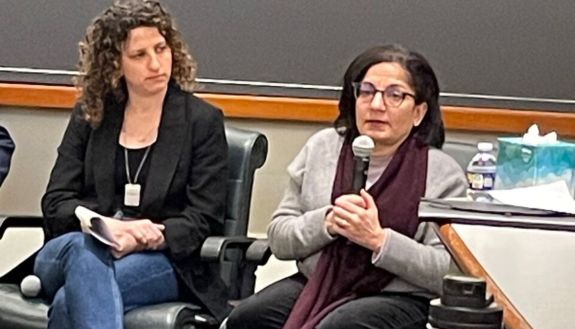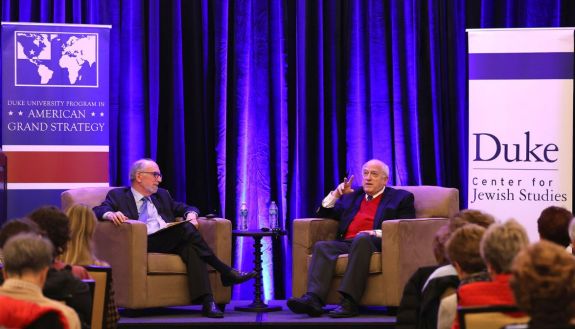Salam Fayyad on the Day After the War in Gaza
Upcoming Events in the Provost’s Initiative on the Middle East
Wednesday, April 3
5 p.m. “Literature Through Silence: A Lecture by Adania Shibli.” Nelson Music Room, 201 East Duke Bldg.
Monday, April 8
6 p.m. Robert Satloff: “Out of Crisis, Opportunity? War and Peace in Post-Oct 7 Middle East.” 04 Sanford School
“There has been a failure to address this question seriously in Palestine, and unfortunately to me suggests that there is a preference for the status quo. That is definitely to be regretted against the background of the war in Gaza.
“If there is ever a moment when Palestine should find a way to manage this pluralism, sit around the table and be ready to do that as soon as possible for Gaza, it is now.”
Fayyad long dedicated himself to state-building in Palestine, first as a trained economist working with the International Monetary Fund in the region, then as an adviser and finance minister for the Palestinian Authority before becoming prime minister from 2007-2013.
His leadership efforts supported civil institutions from banking and housing to health and infrastructure toward a stronger Palestinian community.
But amid disappointment over the failure of the “fatally flawed” Oslo agreements to address grievances over territory and provide a way forward to a Palestinian state, Hamas gained strength. This, Fayyad said, increased tensions with the Fatah party government that was ruling Palestine, of which he was a member.
Following a narrow election victory, Hamas assumed power in Gaza in 2007, dividing the Palestinian government. As a result, many of Fayyad’s efforts fell aside.
Turning from history to the current conflict, Fayyad called on Israel to stop the war in Gaza. While supporting a two-state solution, he said it wasn’t the only possible way forward and said the different sides had come to understand what the two-state solution means in different ways.
“The first thing that needs to happen is people must consider ways to get back to the process and what does it take to bring about a convergence. To simply say ‘two-state solution’ won’t resonate well with people in Palestine, because it was supposed to deliver the state of Palestine and it didn’t do that. Support for it is declining.
“What people want to get out of this peace process is an independent state of Palestine on the territories that were occupied in 1967. Not 70% of it, not 80% of it. We want an independent state that is worthy and has the values of being progressive, open and tolerant.”
He is not the only voice in Palestine calling for this. Fayyad said leaders supporting coexistence with Israel must help transform Palestinian politics based on an idea of pluralism that includes Hamas, which remains a powerful political force. He said excluding Hamas would weaken Palestine, noting that “a house divided cannot stand.”
The fact that Hamas does not accept Oslo “should not continue to be used as a reason bring the body politic together. That’s good, that’s pluralism, it’s a good thing the world over. We should not be expected to be a government based on exclusion.”
But in his call for an international investigation of war crimes, he said Hamas must also be held responsible for any violations and should cooperate with any independent, public investigation.
That same standard must also be applied to Israel, Fayyad said, noting the International Court of Justice is considering claims of war crimes against the Israelis.
But he contends that international standards have rarely been applied equally to Israelis and Palestinians. He added that even as Palestinian groups such as Hamas are criticized for not supporting Oslo or recognizing Israel, Israeli Prime Minister Benjamin Netanyahu has publicly dismissed Oslo and current cabinet members refuse to accept Palestine as a state, a disparity that has long historical roots, he said, dating to British colonial rule.
Instead, peace will occur when both sides negotiate from a position of parity, Fayyad said. “To move forward we expect there to be a government in Palestine and a government in Israel, both of which subscribe to the same principles.”
Fayyad also discussed public discourse on the conflict, particularly at American universities. The first principle people should follow, he said, was to take time to leave your comfort zone and listen to others. He noted that activists on all sides have their own understanding of the truth, and he recommended that people not try to spend time “spinning wheels on trying to get others to see that their truth is wrong.”
“If you accept that everyone is entitled to their own truth, and you begin to communicate from that standpoint, you’ll discover that you can find shared space with the other person,” he said.
That shared space, Fayyad said, is where coexistence begins to build.
As part of his visit, Fayyad also talked with students at the law school, where his son is an alumnus, and students at the Sanford School of Public Policy.
PREVIOUS STORIES


